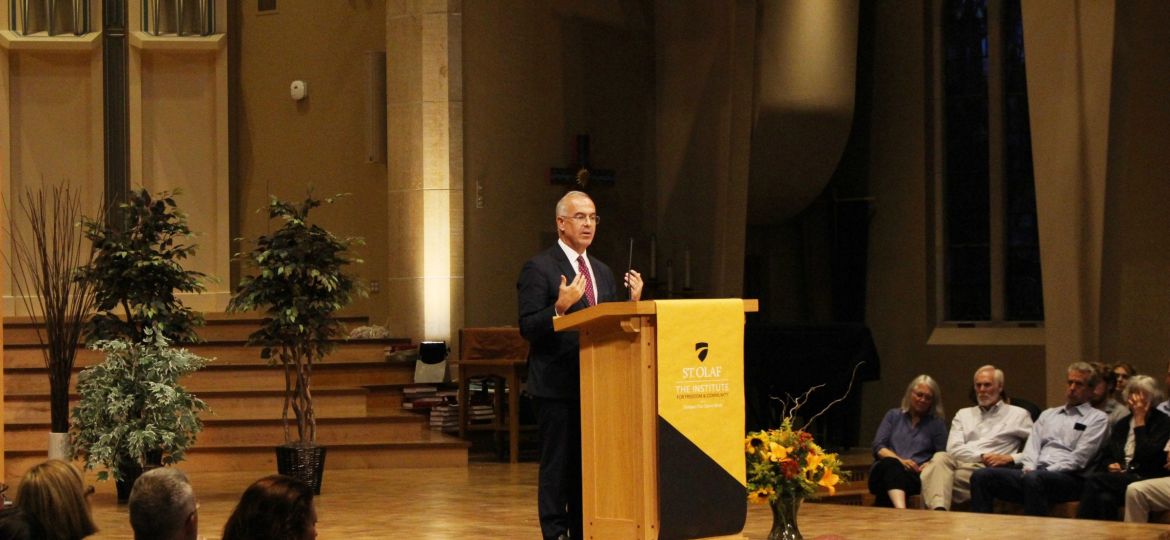
Individuals from across campus gathered in a packed Boe Chapel on Monday, Sept. 24 to hear New York Times Columnist and political commentator David Brooks speak as part of the Institute for Freedom and Community’s 2018 Fall Series, titled “Patriotism, Nationalism, and the Idea of America.”
“Our goal is to help St. Olaf live up to its liberal arts mission through critical inquiry and civil discourse,” Institute Assistant Director Greg Siems said. “With the growth of populist and nationalist movements around the world and the ongoing debate about what being ‘patriotic’ or ‘American’ truly means, Brooks has often reflected on these themes and will set the stage nicely for an exciting slate of Institute-sponsored events this fall.”
A self-described “moderate,” Brooks refuses to side solely with liberals or conservatives, landing him a unique spot as a columnist and political voice.
“Brooks has an against-the-grain quality,” Political Science Professor Dan Hofrenning said. “He is a strong Trump critic and was able to articulate some positive perspectives on Obama, perspectives which other moderate-to-conservative commentators weren’t able to illustrate.”
Hofrenning believes Brooks has a lot to offer students at St. Olaf.
“Brooks will surprise students with some of the angles with which he addresses candidates and will be able to teach students about the non-binary spectrum of politics” he said.
In his speech, Brooks spoke about the growing trends of individualism and tribalism in the modern United States. He provided four main crises of individualism: loneliness, mistrust of institutions and other people, and the “amputation” of ambition. Elaborating on the loneliness crisis, Brooks cited the growing suicide and opioid fatality rates among younger generations of Americans as a direct result of prevalent loneliness. Mistrust of institutions and individuals are correlated in Brooks’ opinion – an individualistic mindset leads to the mistrust of large institutions as a whole, but also to the mistrust of one’s neighbors and peers. Brooks’ concept of amputation spoke to the idea that Americans no longer try to reach for higher goals – America’s ambition has been stunted.
According to Brooks, all of these crises contribute to a growing sense of tribalism among U.S. citizens, where individuals of a given political affiliation harbor a deep sense of hatred for the opposition.
“The coming future is to revert to tribalism,” Brooks said.
Despite these divisions, Brooks thinks that society is reaching a pivot point.
“We are not seeing a political revival, but we are seeing a civic revival,” Brooks said.
Brooks believes that the human foundational needs of relationship and community have begun to tie Americans together again. He gave examples of underprivileged children in major cities turning to community resurgence programs, such as the Baltimore-based Thread program, to spark a growing sense of community.
Brooks spent much of his talk speaking on two primary human conditions.
“Everything we experience as human beings isn’t just cognitive reasoning,” Brooks said. “It is the heart and it is the soul.”
Brooks thinks it is these conditions that will drive society together again. Using examples of spontaneous love and emotion, Brooks called for American citizens to build stronger relationships with their neighbors and within their communities.
“Our problems are down at the foundation, at the substrate of state and economy,” Brooks said. The only way to fix this, Brooks urged, is to redevelop these profound and meaningful relationships between communities and neighbors.
Brooks finished his speech by noting the difference between thick and thin institutions. A thin institution doesn’t have the power to change an individual’s life, explained Brooks. A thick institution, however, does possess that power.
“I believe this is a thick institution,” Brooks said in reference to St. Olaf College. Brooks noted that institutions like St. Olaf and many others have a unique role in society to foster the holistic growth of individuals and to nurture the thoughtful and compassionate resurgence of community in modern America.
Brooks offered numerous thoughts on the overarching themes of the Institute’s fall series “Patriotism, Nationalism, and the Idea of America.” Preaching the necessity of the human heart and soul, Brooks foresees a future which is, above all things, different. Different not just for the U.S., but for the world as a whole. Whether this difference is a good thing or a bad thing, Brooks could not say.
“Cultures change when people on the margins of society find a better way to live – and other people follow them,” Brooks said.







